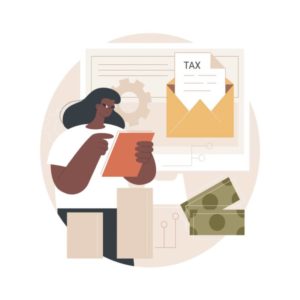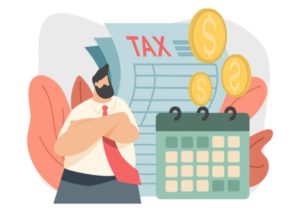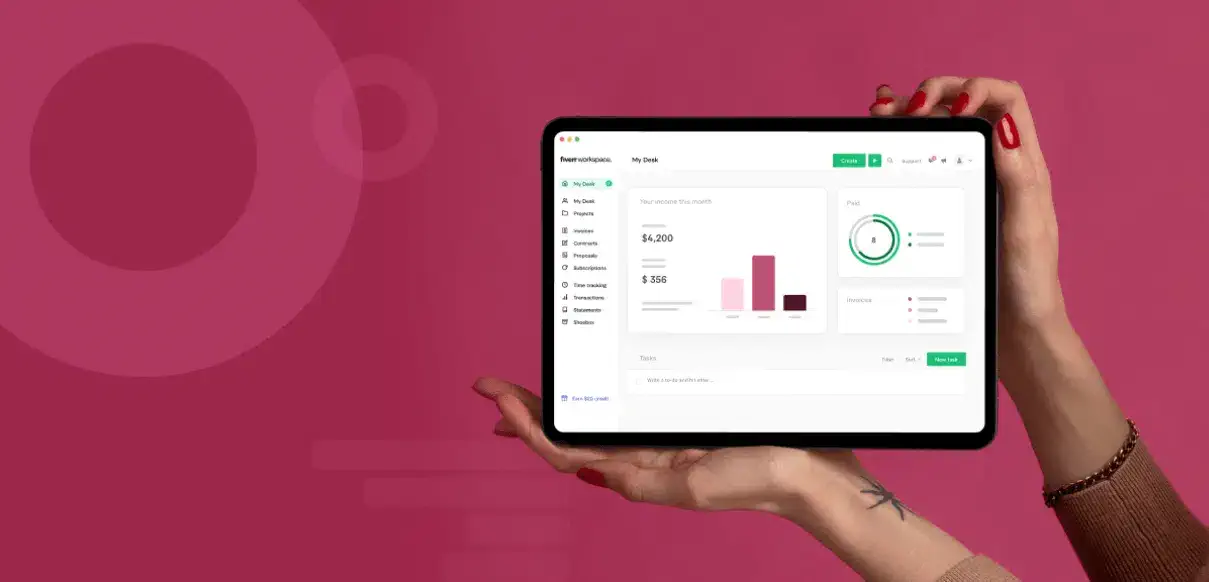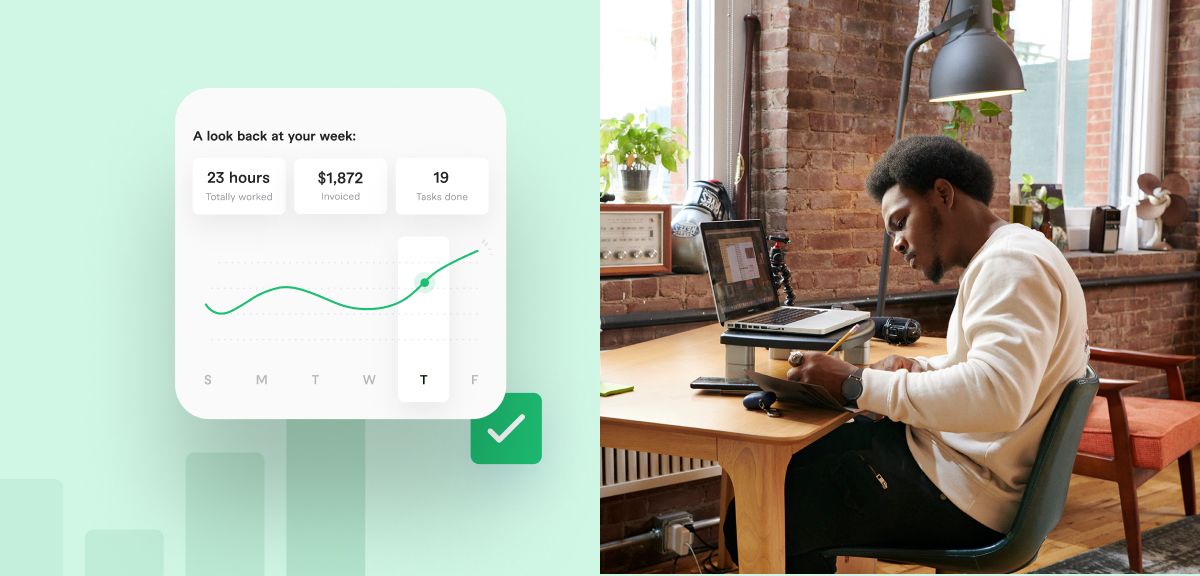Self-Employment Tax Explained
As we mentioned, self-employment tax is a social security and Medicare tax for those who are self-employed. When you’re an employee of a business, you’ll share the responsibility of these taxes with your employer, with each of you paying half. The business will withhold these taxes from your paycheck and then pay the IRS on your behalf. You’ll then pay the remainder of the tax, when you file your annual tax return.
However, when you’re self-employed, it’s up to you to make sure that these taxes are paid in full. In total, your Social Security and Medicare tax is 15.30% of your net earnings from self- employment. Broken down, you’re essentially paying 2.9% Medicare tax and 12.4% Social Security.
Who Needs to Pay Self-Employment Tax?
The following is a non-exhaustive list of the types of people who need to pay self- employment tax:
Self-employed individuals, who have net earnings of $400 or more from self-employed work throughout the year;
Most partners in a partnership, including members of an LLC;
Receiving Social Security benefits does not exempt you from self-employment tax;
Self-employed individuals who have made a loss, although there are rules that may reduce the amount of tax you have to pay, which we’ll cover later.
As an employee of a business, you receive a W-2 tax form, which provides your Social Security number to the business, so that they can withhold these taxes from your paycheck. When you’re self-employed, you’ll need to file a Schedule SE with your tax return. This is where you’ll calculate your self-employment tax liability and pay the appropriate amount.
What is Schedule SE?
A Schedule SE is a tax form that you’ll need to file if you’re a freelancer paying self- employment tax. The form makes up part of Form 1040, which is the IRS tax return form for individual income tax. The Schedule SE is the part of Form 1040, where you’ll calculate your self-employment tax liability and pay the appropriate amount.
Schedule SE outlines who needs to file the schedule, and how much tax you need to pay on your net earnings from freelance work you’ve done throughout the year.
There are a few different sections of Schedule SE that apply to different kinds of self- employed individuals. For example, Schedule C is for those who are sole proprietors or independent contractors. You’ll record your net profit or loss in line 31 of Schedule C. The form explains how to calculate this by subtracting line 30 (your expenses) from line 29 (your tentative profit or loss), but a freelance tax calculator can also help you to work out your numbers accurately.
Those who are partners in a business or LLC will need to complete Schedule K-1. Often, the income that you earn from a partnership is taxable as self-employment tax, which is why you’ll find Schedule K-1 is mentioned in many resources that deal with self-employment tax. As a freelancer, this will not apply unless you’re in a partnership in another business.
How to Calculate Your Self-Employment Tax
Even if you’re using a self-employed tax calculator or an accountant to work out your self- employment tax for the year, it’s important to know how to calculate it yourself. Part of being a successful freelancer is knowing the ins and outs of your taxes, so that you can be confident that everything is being done correctly.
Before you start calculating your self-employment tax
If you’re a freelancer, you’ll more than likely be receiving self-employment income from a range of clients. This means that you’ll need to know your total net earnings from self- employment for the year, as this is what you’ll use to calculate your self-employment tax.
This is where a 1099-MISC form or 1099-K form comes in. For every freelance client you’ve worked with during the year, you should receive a 1099-MISC form. A 1099-K form is used if you receive income from a marketplace platform or payment processor, and reports the total amount of money you’ve earned from that source.
The 1099 form will show how much money you’ve earned from that client during the year, and it’s this number that you’ll use to calculate your total net earnings. The 1099 form ensures that you are declaring all of your income and not underpaying your taxes. You’ll use this form to work out your gross earnings – i.e., the total amount of money you’ve earned from self-employment during the year, before you’ve deducted expenses. You can then go on to calculate your self-employment taxes.
Step 1: Work Out Your Net Earnings
To calculate your self-employment tax, you’ll need to know your net earnings from self- employment for the year. Your net earnings are your total income from freelancing, minus any allowable business expenses. Tax deductible business expenses include items like the cost of goods sold, office expenses, travel expenses, and marketing costs.
Tax deductible simply means that the IRS allows you to subtract these expenses from your total income, in order to arrive at your net earnings. As a freelancer, you should empower yourself with knowledge on which business expenses are tax deductible, so that you can keep track of them throughout the year and save money.
Your workings out of your net income might look something like this:
Gross income from freelancing: $30,000
Minus business expenses: -$12,000
Equals net income: $18,000
Step Two: Calculate Your Self Employment Tax
Once you know your net earnings, you can calculate your self-employment tax. The current rate of self-employment tax is 15.30%. This means that you’ll multiply your net earnings by 0.1530 to arrive at the amount of self-employment tax you need to pay.
For example, if your net earnings are $18,000, your self-employment tax would be $2754.
$18,000 x 0.1530 = $2754
You can double check your calculations using Fiverr Workspace’s self-employed tax calculator. This free tax calculator allows you to input your revenue, your operating expenses, and your additional deductible expenses, and provides you with calculations for your net profit, your self-employment income, and a self-employment tax estimate.
Important to note:
The amount subject to self-employment tax is 92.35% of your net earnings.
There is also a maximum amount of net earnings subject to social security tax. For 2022, the maximum taxable amount is $147,000.
Your full amount of net earnings is, however, subject to the Medicare tax.
Fiverr Workspace’s self-employed tax estimator takes all of the above into account, when working out your estimated self-employment tax.
Step Three: Pay Your Self-Employment Tax
Of course, once you’ve calculated your self-employment tax, you’ll need to pay it. It is not advisable to pay your self-employment tax all at once, as the IRS notes that “Taxes must be paid as you earn or receive income during the year”.
Quarterly estimated tax payments are typically made and estimated tax is payable by any freelancer, who expects to owe $1,000 or more when they file their returns. When you pay your estimated tax, you’ll use Form 1040-ES to work out your estimated self-employment tax. If you don’t pay your self-employment tax on time, you will be subject to penalties, so it’s always best to stay on top of your quarterly tax payments. For the purposes of this article, we’ll focus on using Section C and Schedule SE to calculate and file your self-employment tax.
After completing Schedule SE, you’ll need to file it and pay your self-employment tax. You can do this online, by mail, or through a tax professional. The method you choose will be based on your individual needs and preferences.
The best way to pay your self-employment tax is through the Electronic Federal Tax Payment System (EFTPS). This is a free service offered by the IRS, and it allows you to pay your taxes electronically. You can also use EFTPS to pay other federal taxes, like your income tax, which we’ll explain briefly later in this article.
Paying your self-employment tax through EFTPS is easy. You simply need to set up an account and then follow the instructions to make a payment. When you set up your EFTPS account, you’ll need to provide your social security number.
This is exceptionally important to note as your social security number is how the IRS identifies you and your tax records. When you’re completing your Schedule SE and creating your account on EFTPS, accuracy is vital to avoid any confusion or delays.
You can also pay your self-employment tax by check or money order. If you choose to do this, you’ll need to make your check or money order payable to the “United States Treasury” and mail it to the address listed on your Schedule SE. Be sure to include your social security number, the tax year, and “Schedule SE” on the check or money order.
Additional Self Employment Tax Deductions
As a freelancer, you’re able to deduct half of your self-employment tax from your income taxes. This is because, as an employer, you would normally be responsible for paying half of the Social Security and Medicare taxes owed by an employee.
Since you are both the employer and the employee when you’re self-employed, you can deduct half of the self-employment tax you paid. This deduction is taken as an adjustment to income, which means you can claim it even if you don’t itemize deductions on your tax return. The instructions for Schedule SE will tell you how to figure out your deduction for half of your self-employment taxes.
It’s important to note that the deduction for half of your self-employment taxes only applies to the Social Security and Medicare taxes owed. It does not apply to any other taxes, like federal income tax or state income tax.
In some cases, you may be eligible for a credit against your self-employment tax. The two most common credits are the earned income credit and the child and dependent care credit. The earned income credit is a refundable credit for low- and moderate-income taxpayers. To be eligible, you must have earned income under $57,414 and have investment income under $10,000 in the last tax cycle. The child and dependent care credit is a non-refundable credit that can reduce the amount of tax you owe by up to $8,000.
To be eligible, you must have paid someone to care for your child or dependent so that you could work or look for work.
Frequently Asked Questions
What is the difference between income tax and self-employment tax?
Self-employment tax is a Social Security and Medicare tax for individuals who work for themselves. It is calculated on the net earnings from self-employment. Income tax is a tax that is imposed on all forms of income, including wages, salaries, tips, interest, dividends, and capital gains. Income tax is calculated on the total amount of income earned, whereas self-employment tax is only calculated on the net earnings from self-employment.
You will need to pay both taxes if you are self-employed. As we’ve mentioned before, Form 1040 is used to report both income tax and self-employment tax. As a reminder, Schedule SE is the part of Form 1040 where you will calculate your self-employment tax.
What is the difference between FICA and self-employment tax?
FICA is the Federal Insurance Contributions Act and it requires employers to withhold Social Security and Medicare taxes from their employees’ pay checks. The employer is then responsible for matching the amount of tax withheld and paying it to the government.
Self-employment tax is similar to FICA, which is why it’s often called SECA, but it is paid by self-employed individuals rather than by employers. At the core of both FICA and SECA is the fact that they are Social Security and Medicare taxes.
The main difference is who pays the tax. With FICA, it’s the employer who withholds the tax from the employee’s paycheck and pays it to the government. With SECA, it’s the self-employed individual who is responsible for calculating and paying the tax.
Can I claim tax deductions on my home office if I work from home?
If you’re self-employed and work from home, you may be able to deduct the cost of your home office from your taxes. The deduction can be taken for a portion of your mortgage interest, rent, utilities, and insurance. To claim the deduction, your home office space must be used exclusively for business and it must be the principal place of business.
You don’t have to own the property to claim the deduction, but if you do own the property, you can only deduct the business-use portion of the expenses. Form 8829 is used to calculate the deduction for business use of your home. It should be noted that this is only applicable to self-employed individuals and not remote workers, who are employed by a business and receive a W-2 tax form.
Is there a limit up to which I don’t have to declare my self-employment income?
No, there is no limit up to which you don’t have to declare your self-employment income. All income, regardless of the amount, is required to be reported on your tax return. This includes any money earned from freelancing, consulting, or any other type of self- employment.
The only exception to this rule is if the total amount of income you earned from all sources is less than the standard deduction. For the 2022 tax year, the standard deduction is $12,950 for single taxpayers. If you’re earning your self-employment income from church activities, you won’t have to pay self-employment tax on this amount unless your total earnings exceeds $108.28 in a year.
Being responsible for your self-employment tax is part and parcel of being your own boss. While it’s important to know exactly how to calculate your self-employment tax, there are many resources available to help make the process fast and efficient.
Fiverr Workspace’s self-employed tax calculator is one such resource that can take the guesswork out of tax season for self-employed individuals. It’s also important to keep track of your self- employment income and expenses throughout the year, so that you can be as prepared as possible come tax time.




